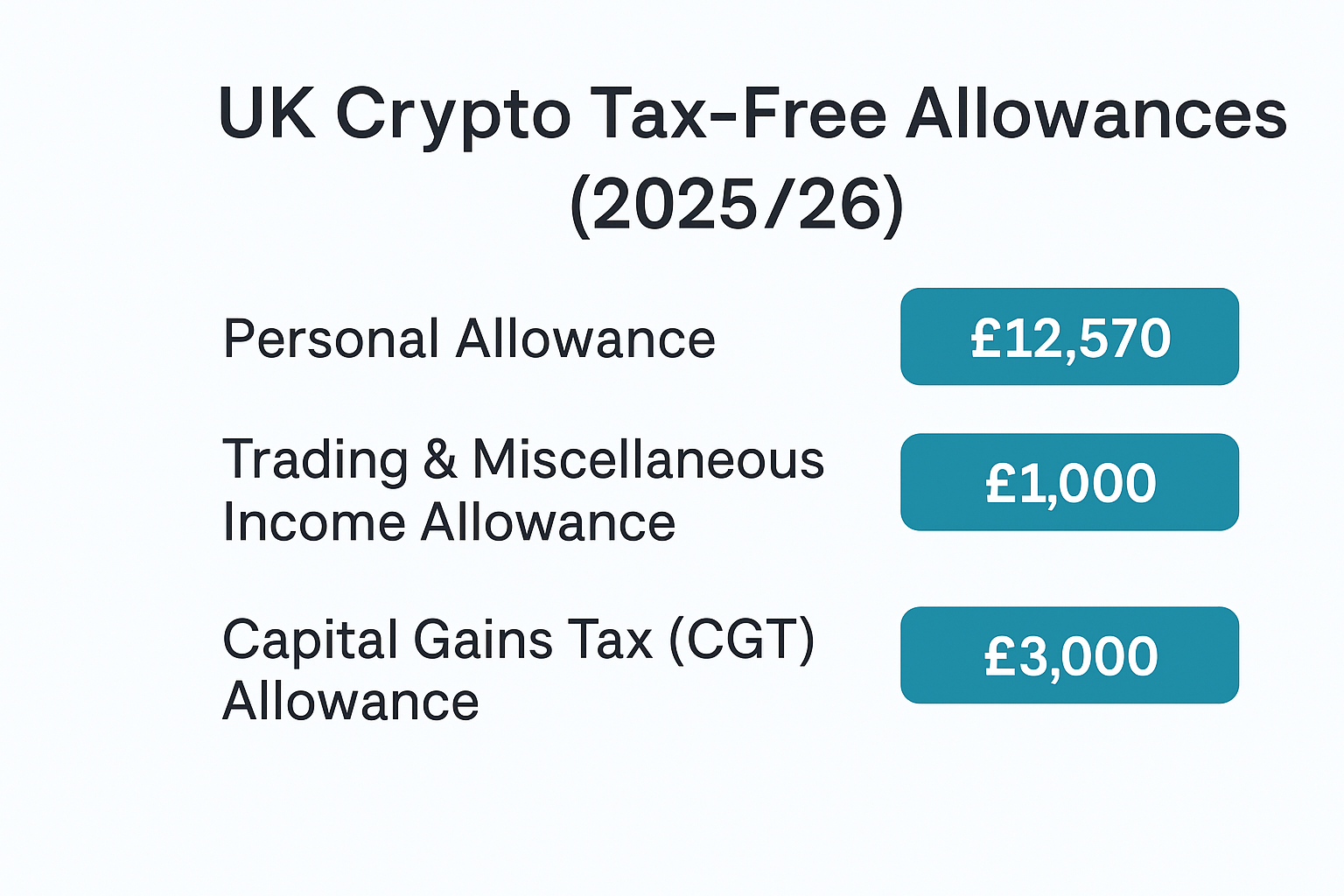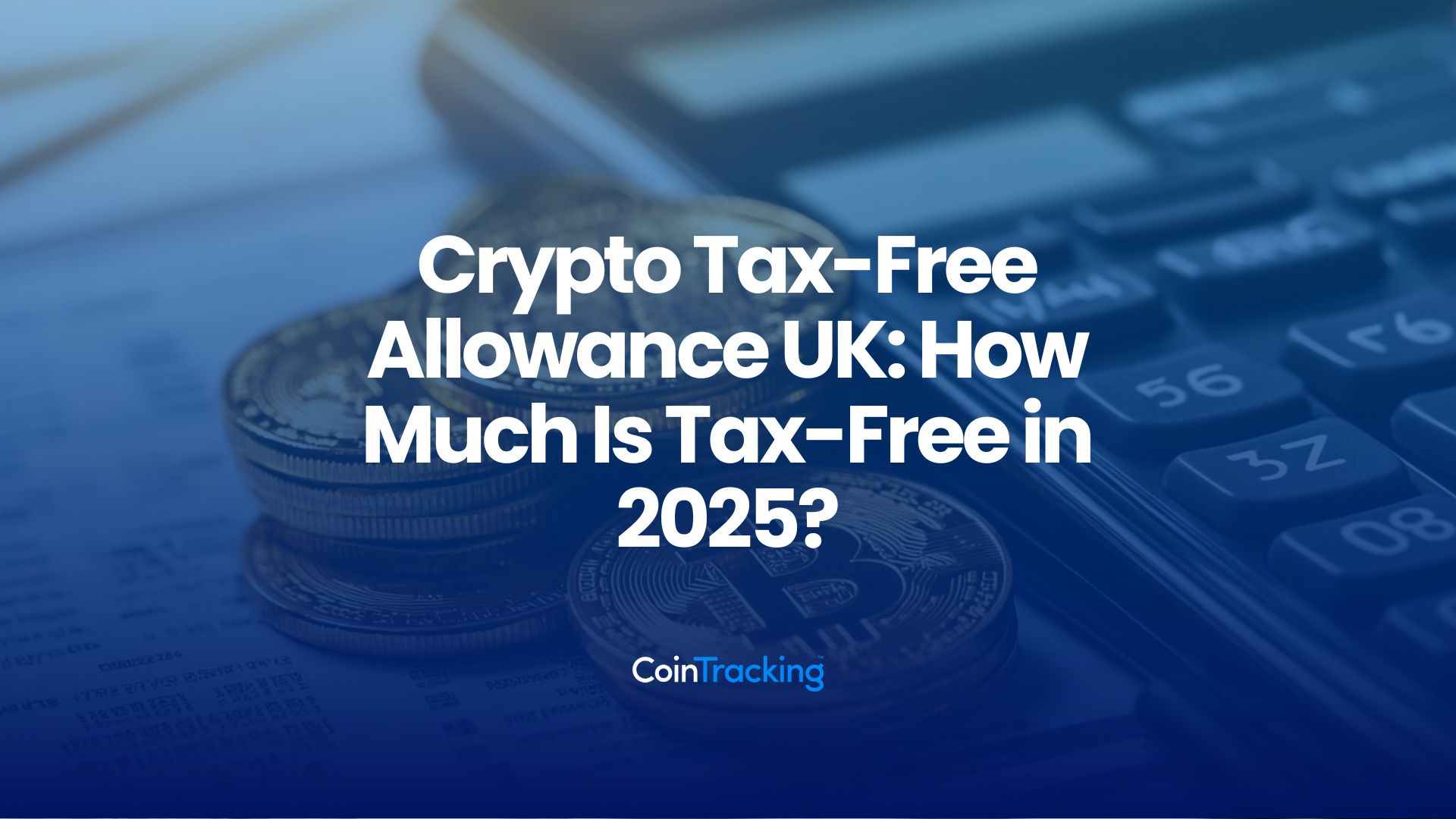Not all your crypto gains are taxed in the UK. HMRC provides tax-free allowances that reduce or even eliminate the tax you owe on cryptocurrency income and capital gains. This guide explains how much of your crypto is tax-free in 2025, how the different allowances work, and how you can maximize them to save money.
For a full overview of UK crypto taxation, start with our UK crypto tax guide.
Key Takeaways about Crypto Tax-Free Limits in the UK
- The personal allowance lets you earn up to £12,570 tax-free in income.
- The Capital Gains Tax allowance is £3,000, meaning only gains above this amount are taxed.
- Gifting crypto can be tax-free in some cases, but capital gains may still apply.
- CoinTracking helps you plan disposals and stay within your tax-free limits.
UK Income Tax Allowances for Crypto Holders
While selling crypto at a profit usually falls under Capital Gains Tax (CGT), some crypto activities generate income and are therefore subject to income tax. Crypto income can come from:
- Crypto staking rewards
- Crypto lending interest
- Crypto Airdrops (in most cases)
- Crypto mining rewards
- Being paid in crypto (salary, freelance payments, etc.)
Any income generated from crypto activities is added to your total yearly income (including wages, dividends, etc.) and taxed at your applicable income tax rate. However, you can use your personal allowance and the trading allowance to reduce your taxable income.

Personal Tax-Free Allowance
Every UK resident has a personal allowance of £12,570 (2025/26 tax year). This means you can earn up to this amount in total yearly income (including wages, self-employment, and crypto income) before paying any Income Tax.
If your only income is from crypto, you may pay no income tax if your total income stays below this threshold. If you earn above this, only the amount exceeding the allowance is taxed at your applicable rate.
Example: Crypto income under the Personal Allowance
Explanation: Total crypto income is £4,200, well below the £12,570 personal allowance. This means no Income Tax is due if no other income is generated from other sources.
Your Crypto Portfolio Manager
Trading, Mining & Additional Income Exemptions
In addition to the personal allowance, HMRC provides a £1,000 miscellaneous income allowance. If your total crypto income is below this threshold in a tax year, it may not need to be reported. If you earn more than £1,000, the entire amount is added to your total taxable income for the year and taxed at your personal income tax rate (0% to 45%).
For detailed guidance on how HMRC taxes each income type, see our guide on crypto taxes in the UK.
Example: Trading under the £1,000 allowance
Explanation: Profit is £800, which falls entirely within the £1,000 trading allowance. No income tax is due, assuming no other income sources exist.
Capital Gains Tax Exemptions for Crypto
When you dispose of your crypto, you may create a capital gain or loss. However, you only pay tax if your total gains exceed the annual CGT allowance.
Every UK resident has a Capital Gains Tax allowance of £3,000 (2025/26 tax year). This means that total net gains up to this amount (after subtracting allowable losses) are tax-free.
HMRC applies special rules to match disposals and acquisitions, including the same-day rule, the 30-day rule, and the Section 104 pool. These rules determine the holding period of your crypto and can affect whether you realise a gain or a loss. For a full explanation of how the holding period works and how disposals are matched, see our Crypto Holding Period in the UK guide.
Example: Gains within the CGT allowance
Explanation: The gain is £2,200, which is below the £3,000 CGT allowance. No Capital Gains Tax is due, assuming no other capital gains are realised in the same tax year.
Example: Gains above the CGT allowance
Explanation: The gain is £5,000. The first £3,000 is tax-free, but the remaining £2,000 is subject to Capital Gains Tax at your applicable rate. This calculation assumes no other capital gains are realised in the same tax year.
Crypto & Inheritance Tax in the UK
Crypto is treated as property in the UK, which means it can be passed on through gifts or inheritance. Just like with other assets, HMRC may apply Capital Gains Tax (CGT) or Inheritance Tax (IHT) depending on the situation.
Gifting Crypto to Friends or Family
Gifting crypto is generally considered a disposal and subject to CGT. This means that if the value of the crypto has increased since you acquired it, you may have to pay CGT on the gain, even though you did not sell it for cash.
The good thing is, there are some exemptions:
- Spousal transfers: Gifts to your spouse or civil partner are tax-free and do not trigger CGT.
- Annual gifting allowance: You can give away assets worth up to £3,000 per year without them being added to your estate for IHT purposes.
- Small gift exemption: You can also give up to £250 per person per tax year.
Using Your Annual CGT & Gifting Allowances
If you plan to gift crypto, you can combine the Capital Gains Tax allowance with your annual gifting allowances to reduce or even eliminate the tax impact.
- The CGT allowance for the tax year 2025/26 is £3,000, meaning you can realise up to this amount in net gains tax-free.
- The annual gifting allowance for Inheritance Tax is also £3,000. Gifts within this limit do not count towards your estate for IHT purposes.
- If you did not use your IHT gifting allowance in the previous tax year, you can carry it forward once, giving you up to £6,000.
Example: Using allowances effectively
If you gift crypto worth £5,000 to a family member, and your gain on that crypto is £2,500:
- The £2,500 gain is fully covered by the CGT allowance, so no Capital Gains Tax is due.
- The £5,000 gift is partly covered by the IHT gifting allowance (£3,000 this year + £2,000 carried forward from last year).
This way, both CGT and IHT obligations are avoided, provided no other disposals or gifts exceed the allowances in the same year.
Best Practices for Crypto Gift Documentation
When gifting crypto, it is important to keep clear records so HMRC can see what assets you gifted and how you calculated any potential tax liability.
What to record when gifting crypto:
- The date of the gift
- The type and amount of crypto gifted
- The market value in GBP at the time of the gift
- The recipient’s details (at least name and relationship)
- How you calculated the gain or loss compared to your acquisition cost
Crypto Tax Tools for Smart Planning
Managing allowances across income, capital gains, and gifts can be challenging, especially if you hold crypto on multiple wallets and exchanges. Using the right tools can help you stay on top of your tax-free limits and avoid surprises at year-end.
CoinTracking is one of the most effective tools for this purpose and helps you with:
- Tracking your crypto disposals and applying HMRC’s matching rules (same-day, 30-day, Section 104 pooling)
Calculating gains and losses automatically - Recording gifts and transfers with market values at the time of the transaction
- Generating HMRC-ready tax reports for your Self Assessment
With proper planning and accurate tracking, you can make the most of your tax-free allowances and keep your crypto taxes under control.
How to Maximise Your Tax-Free Allowances
The UK offers several tax-free allowances that can significantly reduce your crypto tax bill if used wisely. Here are some practical strategies:
- Plan disposals around the CGT allowance: Spread out crypto sales over multiple tax years to stay within the £3,000 CGT allowance each year.
- Use both spouses’ allowances: Married couples and civil partners can transfer crypto between each other tax-free. This allows you to double your allowances (CGT and Personal Allowance) as long as both partners file their taxes.
- Offset losses against gains: Report allowable losses to HMRC to reduce your taxable gains. For details, see our guide on offsetting crypto losses in the UK.
- Leverage the trading allowance: Small amounts of crypto income (up to £1,000) may not need to be reported, but keep detailed records in case HMRC asks.
- Time gifts strategically: Use your £3,000 annual gifting allowance (or £6,000 if you carry over the previous year’s unused amount) to reduce potential inheritance tax exposure.
For complex situations or if you're unsure, the CoinTracking Full-Service connects you with tax experts who can help you navigate the process and maximize your allowances.
Creating a Crypto Tax Return Made Easy
FAQ About the UK Crypto Tax-Free Allowance
What is the current capital gains tax allowance for cryptocurrencies in the UK?
For the 2025/26 tax year, the Capital Gains Tax allowance is £3,000. You only pay tax on gains above this threshold.
How do I report my cryptocurrency gains on my tax return?
You need to report gains through the Self Assessment tax return. This can be done online or by filing a paper return. For disposals, use the SA108 Capital Gains Summary form.
Can I gift cryptocurrencies to friends or family without incurring tax?
It depends. Gifts to a spouse or civil partner are tax-free. Other gifts are treated as a disposal, which may trigger Capital Gains Tax if your gains exceed the allowance. For inheritance planning, you can also use the £3,000 annual gifting allowance. See our section on Crypto & Inheritance Tax in the UK.
Conclusion – Make the Most of Your Crypto Tax-Free Allowance in the UK
Crypto investors in the UK can take advantage of several tax-free allowances to lower their tax bill. By planning disposals carefully, reporting losses, and using gifting allowances, you can make the most of these tax breaks. Accurate records are essential, and CoinTracking helps by automatically importing transactions from exchanges and wallets, applying HMRC’s matching rules, calculating gains and losses, and generating HMRC-compliant tax reports. This saves time, reduces errors, and makes it easier to stay compliant.
Disclaimer
The information provided in this article is for educational and informational purposes only. It is not intended as financial, investment, tax, or legal advice. Cryptocurrency investments are highly volatile and carry significant risks. Before investing in cryptocurrencies, conduct thorough research, consult with a financial advisor, and ensure you understand the risks involved. The author and publisher are not responsible for any financial losses or damages that may occur from following the information presented in this article. Always use caution and make informed decisions when dealing with cryptocurrencies.





